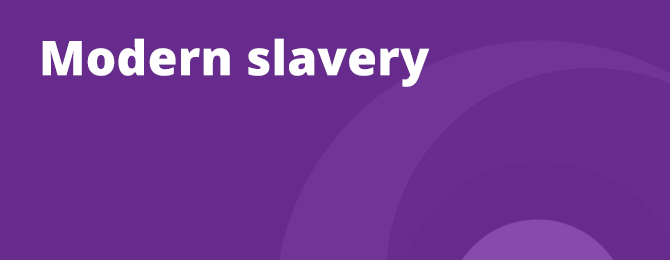Modern Slavery

Modern slavery is a serious crime. Victims are:
- exploited
- controlled or held captive
- threatened or punished to stop them escaping or reporting the crime
Anyone can be a target for modern slavery. But some people can be at greater risk because of money, social or health issues, or their age or immigration status.
Threats and punishments can often be violent, but not always. They can include threatening to tell the authorities about the victim's immigration status in order to get them deported from the country.
Modern slavery includes human trafficking. This is when victims are taken between countries or around a country so they can be exploited.
Modern slavery takes many forms, including:
- Forced labour: victims are forced to work against their will, often working very long hours for little or no pay in dire conditions under verbal or physical threats of violence.
- Debt bondage: victims are forced to work to pay off debts that, realistically, they will never be able to.
- Sexual exploitation: victims are forced to perform non-consensual or abusive sexual acts against their will, such as prostitution, escort work, and pornography. Adults are coerced, often under the threat of force or another penalty.
- Criminal exploitation: often controlled and maltreated, victims are forced into crimes such as cannabis cultivation or pickpocketing against their will.
- Domestic servitude: victims are forced to carry out housework and domestic chores in private households with little or no pay, restricted movement, very limited or no free time, and minimal privacy, often sleeping where they work.
- Child trafficking: young people (under 18) are moved internationally or domestically so they can be exploited.
- Organ harvesting, where people are trafficked in order to sell their body parts and organs for transplants, includes eggs, kidneys, and eyes.
It's more common than you think and can happen anywhere. We're working with our partners to stop modern slavery and human trafficking. Get advice from Devon and Cornwall Police on what to do if you think someone's a victim of modern slavery where you work or live.
How criminals exploit their victims
Forced labour
Forced labour is when victims are threatened or physically forced into working in someone's home or business. Criminals might also trick their victims by promising real work in another place or country, then forcing them into slavery once they arrive.
Even if a victim seemingly agrees to the work, we can still prosecute if the work and conditions aren't acceptable. Nobody can agree to being exploited.
Victims can work very long hours for little or no pay. They are often kept in terrible conditions. But it is still modern slavery if the victim is kept in decent conditions but is not free to leave or live their lives as they want.
Victims can be forced to do any kind of commercial work. Common examples include:
- on a fishing boat
- in fields
- as a builder
- in a hotel
- in a factory
- as a cleaner in an office or shop
- in nail bars
- in car washes
But they can also be forced to work in people's homes, cooking and cleaning as domestic slaves.
Criminal exploitation
Criminal exploitation is when victims are made to commit crimes like:
- shoplifting
- pickpocketing
- stealing fuel from cars
- benefit fraud
Drugs
Some victims of the drug trade are forced to work as cannabis growers. Others are used to distribute or sell drugs.
County lines are one form of criminal exploitation. This is where vulnerable people, often children, are used to carry drugs from cities to sell them in nearby towns and the countryside.
Find out more about county lines
Sexual exploitation
Victims are forced into sex work or to perform sexual acts against their wishes and without their consent. This includes escort work, pornography, or making indecent images of children.
Most victims of sexual exploitation are women and children, but men can also be affected.
Organ trafficking
Victims are moved from one place to another so they can have their body parts removed. These are then sold for surgical transplants. Body parts include tissues and organs, for example, kidneys.
Spotting modern slavery
Modern slavery can happen anywhere in any situation. Each case is different and may not fit the stereotype of groups of people being forced to work in fields or on fishing boats.
The signs of forced labour and criminal or sexual exploitation can be very different. Victims might look helpless and afraid, but they can also seem to accept their situation, be completely unaware of it, or even defend the people who are exploiting them.
Report it and get support
If you think modern slavery is happening, tell someone as soon as you think it's safe to do so. This could be about a victim, a suspect, or a particular business or place. You will always be taken seriously, and protection and support are available.
You can report modern slavery to the police using their online crime reporting service.
Or call the police on 101 at any time. If you have a hearing or speech impairment, use our textphone service at (18001 101.
If you suspect someone is in immediate danger, call 999 now.
To report a suspicion or get advice, you can contact the Modern Slavery Helpline confidentially at 08000 121 700.
If you want to remain anonymous, you can contact Crimestoppers at 0800 555 111.
More information
- Modern slavery - Plymouth City Council
- Modern slavery - Devon and Cornwall Police
- Modern slavery - GOV.UK

Is the information correct?
Let us know if the information on this page is wrong and needs to be updated.
Want to create a page on the Plymouth Online Directory? Register for free and add a page - it only takes a few minutes.




